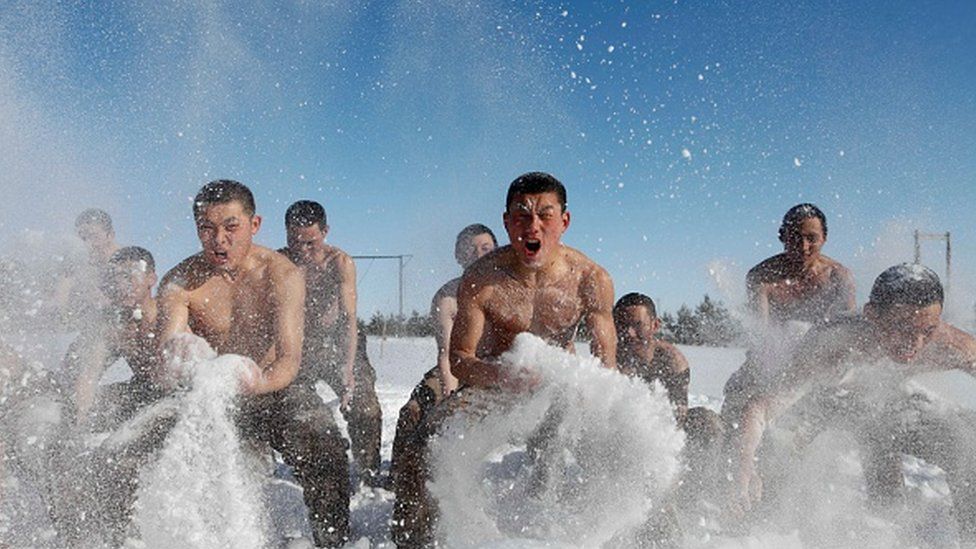China promotes education drive to make boys more 'manly'
- Published

A notice from China's education ministry has caused a stir after it suggested young Chinese men had become too "feminine". The message has been criticised as sexist by many online users - but some say China's male celebrities are partly to blame.
For a while China's government has signalled concern that the country's most popular male role models are no longer strong, athletic figures like "army heroes". Even President Xi Jinping, a well-known football enthusiast, has long been seeking to cultivate better sports stars.
So last week, the education ministry issued a notice with a title that left no doubt about its ultimate goal.
The Proposal to Prevent the Feminisation of Male Adolescents called on schools to fully reform their offerings on physical education and strengthen their recruitment of teachers.
The text advised recruiting retired athletes and people from sporting backgrounds - and "vigorously developing" particular sports like football with a view to "cultivating students' masculinity".
It is a decisive push in a country where the media does not really allow for anything other than squeaky clean, "socially responsible" stars.
But there were some earlier signs suggesting such a move was coming. Last May, a delegate of China's top advisory body, Si Zefu, said that many of China's young males had become "weak, timid, and self-abasing".
There was a trend among young Chinese males towards "feminisation", he claimed, which "would inevitably endanger the survival and development of the Chinese nation" unless it was "effectively managed".
Si Zefu said the home environment was partly to blame, with most Chinese boys being raised by their mothers or grandmothers. He also noted that the growing appeal of certain male celebrities meant that many children "did not want to be 'army heroes'" anymore.
So, he suggested, schools should play a greater role in ensuring young Chinese get a balanced education.
'What are men afraid of?'
The overwhelming majority of Chinese reaction to the notice has been negative. Hundreds of thousands of Chinese have taken to social media to voice their anger, with many branding the government's message sexist.
"Is feminisation now a derogatory term?" one Weibo user asked, receiving over 200,000 likes. Another said: "Boys are also humans… being emotional, timid or gentle, these are human characteristics."
"What are men afraid of? Being the same as women?" one asked.
"There are 70 million more men than women in this country," another claimed. "No country in the world has such a deformed sex ratio. Isn't that masculine enough?"
Another said: "None of these proposals have come from women."
They might be right there - much has been written previously on how China's top leadership is significantly male-dominated.
From some in the media, though, there was a positive reception for the drive. The Global Times newspaper noted it had "won some support".
On social media platform Sina Weibo, comments pointed towards China's male celebrities being to blame, largely those who are known as "little fresh meats" (小鲜肉). This is a buzzword that refers to young, Chinese male icons who are seen as squeaky-clean, well-groomed, and with delicate features.
Boyband TF Boys and Chinese singer Lu Han fall into this category, as do many K-pop stars.
While figures like basketball player Yao Ming have found overseas fame, it is notable that football specifically is included in the proposal.
That should not come as a surprise. President Xi has previously spoken of his hopes that the country will become a "world football superpower" by 2050.
But repeated attempts to try and up China's football game have failed, and have been mocked as an apparently impossible task. This was the response two years ago when Marcello Lippi, who led Italy to win the 2006 FIFA World Cup, resigned as coach of China's national football team.
Meanwhile, the government has been on a drive in recent months to introduce and promote new role models for young Chinese.
Where women are concerned, the Covid-19 pandemic has been a good opportunity to demonstrate the significant role of women as front-line workers.
And China's achievements in space last year were a great opportunity to promote figures like Zhou Chengyu, who became a viral sensation as a 24-year-old space commander.
But as Si Zefu hinted last year, for young Chinese men the appeal of being strong and fearless soldiers, policemen or firefighters is waning.
The "little fresh meats" phenomenon continues to be a proven success, but young male celebrities come under increased scrutiny, and find it difficult to be anything that departs from the squeaky-clean mould.
In recent years, media have struggled to allow young male stars to appear on Chinese screens with tattoos or earrings. And one of China's top pop stars came under fierce criticism online in 2019 when he was pictured smoking.
Related Topics
- Published25 January 2021
- Published25 October 2017